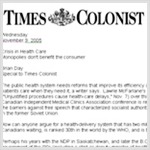
Dr. Brian Day
@DrBrianDay 
- Past President Canadian Medical Association
- Past President Arthroscopy Association of North America
- Honourary Associate Professor University of British Columbia
- 2014 Doctors of BC Don Rix Leadership Award


 Crisis in Health Care
Crisis in Health Care
Monopolies don't benefit the consumer
Brian Day
Special to Times Colonist
The public health system needs reforms that improve its efficiency and offer patients care when they need it, a writer says. Lawrie McFarlane's outrage ("Unjustified procedures cause health-care delays," Nov. 7) over this weekend's Canadian Independent Medical Clinics Association conference is reminiscent of the barriers against free speech that characterized socialist authoritarian thinking in the former Soviet Union.
How can anyone argue for a health-delivery system that has two million Canadians waiting, is ranked 30th in the world by the WHO, and is third in cost?
Perhaps his years with the NDP in Saskatchewan, and later the B.C. NDP government of the '90s (including a stint as deputy minister of health), are the reasons he apparently feels so strongly that governments are meant to rule their citizens, rather than serve them.
CIMCA's mission is to improve health-care access for all Canadians. We believe in a strong public-health system, but we also feel it must be strengthened through reforms that improve its efficiency and offer patients care when they need it.
The Supreme Court of Canada has ruled that changes are needed, and the conference will help us design a better system. We concur with the court that "access to a wait list is not access to care." The contention that doctors, or other health workers, are responsible for such waits is insulting. One might as well proclaim that prison guards are responsible for the increased number of prisoners.
Years ago, economist Robert Evans of the University of British Columbia used the same theory to persuade governments that medical and nursing schools should be cut back. Governments listened and we now have a shortage of doctors and nurses.
During McFarlane's time in Victoria, private clinics experienced their biggest growth in history. They now remove 50,000 suffering patients from public wait lists each year. McFarlane's statement that "our health service has fallen victim to the desire of a group of specialists to stuff their mouths with gold" is an insult to the integrity of a noble and hardworking group of professionals.
Canadian statistics show the percentage of the budget spent on physicians continues to fall and was estimated at 12.9 per cent of total health expenditures in 2003, having declined steadily since 1987 when it peaked at 15.7 per cent.
Specific fees for specialists have also fallen. In 1981, the fee for arthroscopic meniscectomy (the most commonly performed orthopaedic operation) was $294, while today it is $236 (a 1981 dollar is worth $2.11 in 2004).
McFarlane's observation that waits have increased despite large funding increases is correct. The question is why (in Canada) does more funding lead to longer waits, yet in other OECD countries it results in a decrease?
It can hardly be a coincidence that all of the top performing public health systems in the world have a complementary private system. In the wake of the sponsorship scandal and the Gomery inquiry, I find it difficult to understand why we maintained such faith in a government monopoly.
Monopolies do not benefit consumers. Canadians will soon experience public health care with a difference -- no wait lists for rich or poor. The CIMCA conference will show the way. Thanks to the Supreme Court, state-mandated rationing has been ruled unconstitutional. Since the only country that now has such a system is North Korea, I wish proponents, like McFarlane, a pleasant journey and a long stay.
Dr. Brian Day is president of the Canadian Independent Medical Clinics Association.